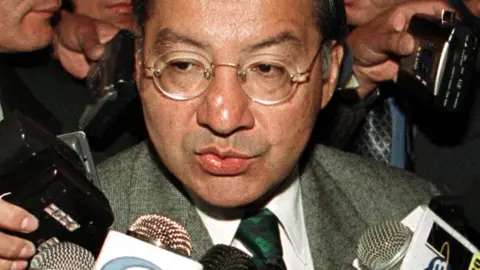Ex-US ambassador Victor Manuel Rocha charged over spying for Cuba
 AFP via Getty Images
AFP via Getty ImagesA former US diplomat who served as ambassador to Bolivia has been charged with working as an agent of the Cuban government for more than 40 years.
Victor Manuel Rocha, 73, is accused of helping Cuba gather intelligence against the US since 1981.
Mr Rocha referred to the US as "the enemy" and claimed his work as a secret agent "strengthened the Revolution", according to court papers.
It was not immediately clear if he had a lawyer to comment on his behalf.
The former diplomat was arrested last Friday in Miami after an undercover sting operation that lasted more than a year, according to the US Department of Justice.
Attorney General Merrick Garland said the case was "one of the highest-reaching and longest-lasting infiltrations" of the US government by a foreign agent.
"For over 40 years, Victor Manuel Rocha served as an agent of the Cuban government and sought out and obtained positions within the United States government that would provide him with access to non-public information and the ability to affect US foreign policy," Mr Garland said.
Born in Colombia, Mr Rocha was raised in New York City and obtained degrees from Yale, Harvard and Georgetown.
He worked as US ambassador to Bolivia from 1999 to 2002, according to prosecutors, and served in several government roles - including at the National Security Council - for 25 years. In addition to Bolivia, he has also served in postings in Argentina, Honduras, Mexico and the Dominican Republican.
The US and Cuba have had a fraught relationship since Fidel Castro overthrew a US-backed government over 60 years ago. The US imposed a trade embargo against Cuba in the 1960s. Former President Barack Obama and former Cuban President Raul Castro took steps to normalise relations in 2015, though former US President Donald Trump later reversed many of these actions.
Court documents unsealed on Monday allege that Mr Rocha made several trips to Cuba, where he helped to advance the interests of Cuban officials from 1981 to the present.
The documents provide few details on the information Mr Rocha allegedly shared, but outline the undercover FBI operation that led to his arrest.
In November 2022, an undercover FBI agent contacted Mr Rocha via WhatsApp, claiming to be a representative of Cuban Intelligence Services delivering a message from "your friends from Havana", the charging document stated.
Mr Rocha allegedly agreed to meet the agent several times, including once at a food court, because there was "no possibility for anyone to see me" there, he said, according to court documents.
During three meetings with the undercover FBI agent, Rocha began to divulge details about his time working as a secret agent for the Cuban government, the charging document alleged.
"I knew exactly how to do it and obviously the Dirección [Cuba's intelligence agency] accompanied me ... lt's a long process and it wasn't easy," Mr Rocha allegedly told the FBI agent.
He repeatedly "described and celebrated his activity" working as an agent for Cuban intelligence services, prosecutors said.
Mr Rocha allegedly used the term "we" to describe Cuba and himself, and said he wanted to "protect ... what we have done".
When the agent, posing as a Cuban spy, asked him "are you still with us?" Mr Rocha responded that he was "angry" to have his loyalty questioned.
"It's like questioning my manhood," he said.
He also at one point referred to himself as being "in charge" during "the knock down of small planes". Prosecutors charge that this was a reference to Cuba's shooting down of two unarmed planes being flown by the anti-Castro, US-based group Brothers to the Rescue.
The incidents in 1996, which occurred while he was working in Havana, resulted in the deaths of four men.
The former diplomat is also accused of providing false and misleading information to the US government and making false statements to obtain travel documents, the justice department said.
In a briefing on Monday, US State Department spokesman Matthew Miller said the department would work with US spy agencies to limit any damage caused by the alleged security breach.
"We will in the coming days, weeks, months, work with our partners in the intelligence community to assess any long-term national security implications for this matter," he told reporters.
